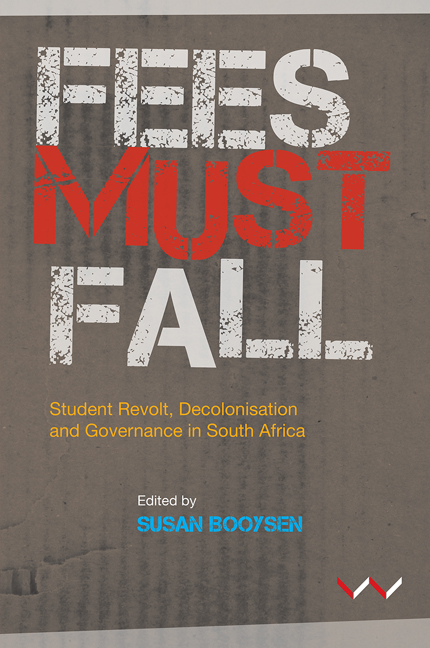Book contents
- Frontmatter
- Contents
- Acknowledgements
- Preface
- Introduction
- PART ONE POWER REDEFINED – ‘WHAT HAPPENED TO GOVERNANCE?’
- PART TWO PRIMARY VOICES – ‘THE ROOTS OF THE REVOLUTION’
- PART THREE THE REVOLT – ‘RISING AGAINST THE LIBERATORS’, SOUTH AFRICA IN AFRICA
- PART FOUR POWER AND CLASS REDEFINED – ‘SIT DOWN AND LISTEN TO US’
- Chapter 9 To win free education, fossilised neoliberalism must fall
- Chapter 10 Bringing class back in: Against outsourcing during #FeesMustFall at Wits
- Chapter 11 Between a rock and a hard place: University management and the #FeesMustFall campaign
- Chapter 12 Financing of universities: Promoting equity or reinforcing inequality
- PART FIVE JUSTICE, IDENTITY, FORCE AND RIGHTS – ‘WE CAME FOR THE REFUND’
- APPENDICES
- Contributors
- Index
Chapter 12 - Financing of universities: Promoting equity or reinforcing inequality
from PART FOUR - POWER AND CLASS REDEFINED – ‘SIT DOWN AND LISTEN TO US’
Published online by Cambridge University Press: 20 April 2018
- Frontmatter
- Contents
- Acknowledgements
- Preface
- Introduction
- PART ONE POWER REDEFINED – ‘WHAT HAPPENED TO GOVERNANCE?’
- PART TWO PRIMARY VOICES – ‘THE ROOTS OF THE REVOLUTION’
- PART THREE THE REVOLT – ‘RISING AGAINST THE LIBERATORS’, SOUTH AFRICA IN AFRICA
- PART FOUR POWER AND CLASS REDEFINED – ‘SIT DOWN AND LISTEN TO US’
- Chapter 9 To win free education, fossilised neoliberalism must fall
- Chapter 10 Bringing class back in: Against outsourcing during #FeesMustFall at Wits
- Chapter 11 Between a rock and a hard place: University management and the #FeesMustFall campaign
- Chapter 12 Financing of universities: Promoting equity or reinforcing inequality
- PART FIVE JUSTICE, IDENTITY, FORCE AND RIGHTS – ‘WE CAME FOR THE REFUND’
- APPENDICES
- Contributors
- Index
Summary
INTRODUCTION
In the context of the recent student uprisings, perceptions have been created that the state should provide free university education or, at the very least, more funds for universities, and that current levels of state funding for this sector are inadequate. Chapter 2 of the Constitution states that everyone has a right to education (which presumably includes higher education) ‘which the state, through reasonable measures, must make progressively available and accessible’. This does not, however, mean that the state has to provide free higher education.
How feasible is it for the South African state to provide free university education? There are at least two important considerations. The first is that in the current economic climate it would not be possible to provide more funding for education in general, and universities in particular, given current and projected low economic growth rates. The growth projections by the National Treasury and private sector experts is of such a conservative nature that the expansionary fiscal policy that has characterised much of the democratic era appears to have come to an end. In other words, the tax base is unlikely to rise significantly to make possible a meaningful increase in education or other social sector spending. The only way in which additional financial resources could be generated by the state at the present time is through increased taxation. However, the chances of this happening are extremely slim given the conservative macroeconomic policy stance of the government especially as regards increasing the tax burden on those at the high end of the income spectrum.
The second consideration, from an equity perspective, and in the context of a stagnating economy, is whether universities should really be getting more public resources in the light of the demand of other more deserving (from an equity point of view) sub-sectors of education such as early childhood development and vocational education and training, as well as other sectoral priorities such as primary healthcare or social grants. As Table 12.1 shows, the technical vocational education and training budget is projected to grow annually by only 4.8 per cent in the Medium-Term Economic Framework (MTEF) period of 2015–2016 to 2018–2019, while university subsidies are projected to increase annually by 9.1 per cent and the National Student Financial Aid Scheme (NSFAS) by 14.1 per cent.
Information
- Type
- Chapter
- Information
- Fees Must FallStudent revolt, decolonisation and governance in South Africa, pp. 256 - 268Publisher: Wits University PressPrint publication year: 2016
